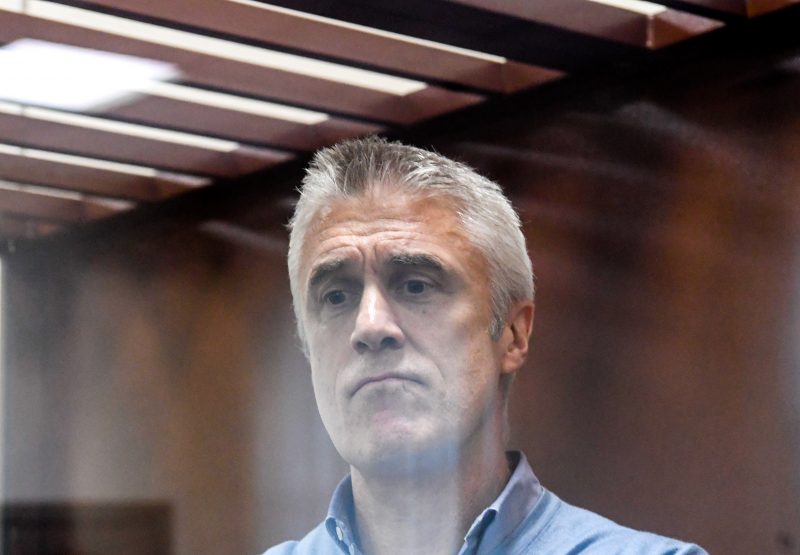Russian court moves US investor Calvey to house arrest
Calvey was arrested in February with five others and accused of defrauding a bank (Kirill KUDRYAVTSEV)
Moscow (AFP) – A Moscow court on Thursday ruled to move Michael Calvey, a prominent American investor who has been behind bars since mid-February on controversial fraud charges, from pre-trial jail to house arrest.
The move came after some of Moscow’s most powerful figures called on the Kremlin to let him go, warning his arrest could discourage the foreign investment Russia’s economy badly needs.
Judge Yulia Safina of Moscow’s Basmanny District Court accepted a request filed by state investigators and ordered Calvey released “in the courtroom,” an AFP correspondent said.
Addressing the judge in Russian from his glass cage, Calvey promised to abide by the conditions of the house arrest.
“To run from Russia for me would be to admit my guilt,” said Calvey, who looked gaunt and did not smile.
Calvey will be confined to his apartment located in an upscale building in central Moscow. His lawyers said he would wear a house arrest monitor.
The founder of the Baring Vostok investment fund, established in 1994, was arrested in February with five other individuals, and accused of defrauding Vostochny Bank of 2.5 billion rubles ($38.7 million).
Calvey is seen as a Kremlin-friendly investor who has steered clear of politics and his arrest has shocked Western business circles.
His multi-billion-dollar equity firm has invested in some of Russia’s biggest companies including Yandex, the Russian search giant, and Ozon, a top online retailer.
Calvey’s release from pre-trial jail came after a Russian court this week ordered the release from house arrest of renowned film and theatre director Kirill Serebrennikov, who is on trial on embezzlement charges.
Calvey and his firm maintain that the case against them is fabricated and being used as an instrument in a shareholder dispute.
– ‘I still believe in Russia’ –
Apparently keen to avoid the politicisation of his case Calvey insists that Russia remains a safe investment destination.
“Despite this corporate conflict, which has turned into criminal prosecution, I would like to reiterate what I have always said: I still believe in Russia’s investment potential,” Calvey said.
On Thursday, the court also ruled to move Alexei Kordichev, a banker who was arrested along with Calvey, to house arrest, a Baring Vostok spokesman said.
An investigator, Lyudmila Samoilenko, said in court that Calvey has three children as well as “stable connections in Moscow, (and) a permanent job” and has given to charity.
Given these factors, investigators appealed to soften Calvey’s pre-trial conditions, she added.
The court had previously denied requests to free the US investor.
Lawyers said it was too early to celebrate, stressing Calvey wanted his associates to be released.
“He believes it is not a victory as long as his associates are in jail,” said attorney Dmitry Savochkin.
This week a court extended for three months the detention of French national Philippe Delpal, also arrested along with Calvey and who has two young children.
Thursday’s decision provides for house arrest until Saturday, at which point investigators would have to extend the measure.
Calvey’s lawyers said he most likely would not be sent back to pre-trial jail.
Investigators say in 2017 a firm controlled by Calvey owed 2.5 billion rubles to Vostochniy Bank and paid the debt with a 59.9 percent stake in Luxembourg’s International Financial Technology Group (IFTG), which was valued at three billion rubles.
The investigators allege IFTG’s real value was only 600,000 rubles.
Calvey has offered to sell the IFTG shares on the open market to see how much they are really worth.
Several prominent figures have spoken out in support of Calvey, including the Kremlin’s business ombudsman Boris Titov and Russia’s sovereign wealth fund head Kirill Dmitriyev.
Baring Vostok says it has invested more than $2.8 billion in 80 companies in Russia, Kazakhstan, Ukraine and other ex-Soviet countries.
Disclaimer: Validity of the above story is for 7 Days from original date of publishing. Source: AFP.


